The Ultimate Guide to the Best Sewing Threads for Every Project
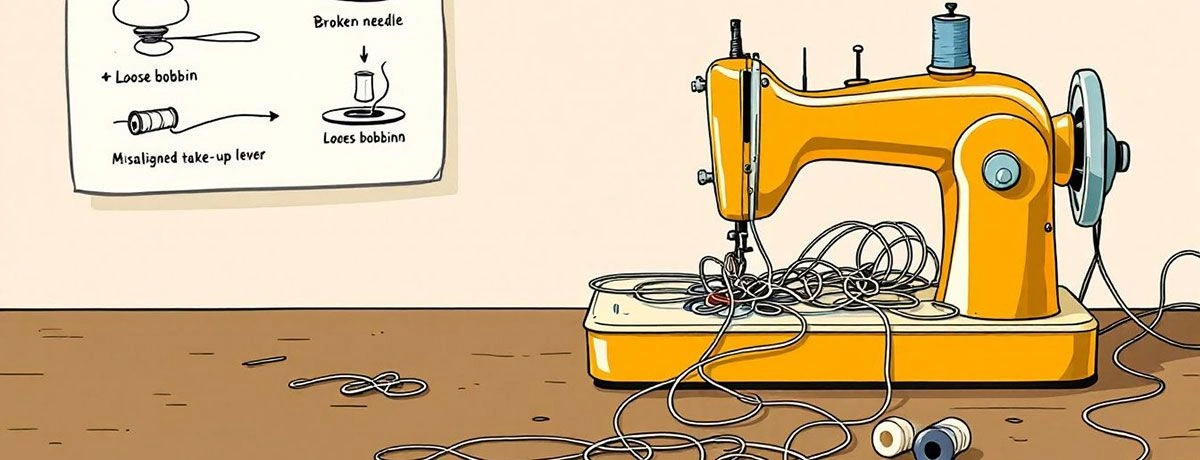
Finding the best sewing threads can make or break your sewing projects. This guide covers top threads for different needs, ensuring durability, ease of use, and high quality.
Key Takeaways
-
Selecting the right sewing thread is crucial for enhancing quality, durability, and appearance in sewing projects.
-
Understanding thread types, such as cotton, polyester, nylon, silk, and specialty threads, ensures informed choices for specific applications.
-
Proper storage and maintenance of threads, along with troubleshooting techniques like adjusting tension and choosing the right needle, are essential for optimal sewing performance.
The Ultimate Guide to the Best Sewing Threads for Every Project

The choice of sewing thread significantly influences the success of sewing projects. It affects not just the quality and durability but also the final look and feel of the sewn item. Selecting the right thread is essential as it greatly impacts the longevity and appearance of your work, whether you’re making garments, quilts, or home decor items.
Different sewing projects require specific thread types to achieve optimal results. Understanding the fundamental characteristics of various thread types, such as cotton, polyester, silk, and nylon, helps in making informed choices for specific sewing needs.
Let’s explore these thread types in detail to see how they can enhance your sewing projects.
Introduction
Choosing the appropriate thread greatly improves the quality of sewing projects and the stitching experience. Consider not only the thread color but also its composition and intended use for the best results.
High-quality threads help prevent common issues like snapping and tangling, making the sewing process more enjoyable.
Understanding Sewing Thread Types
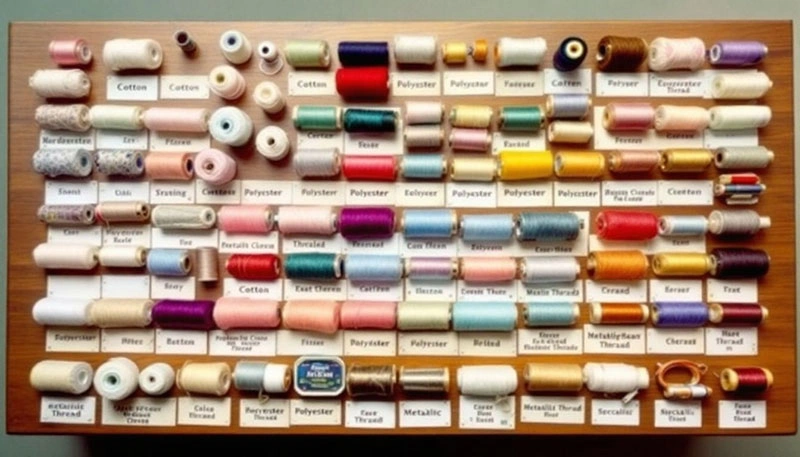
Sewing threads are made from various materials, each with unique properties suitable for specific projects. Whether it’s general sewing, quilting, embroidery, or heavy-duty tasks, understanding these characteristics is crucial.
Here are some common types of sewing threads and their best uses.
Cotton Thread
Cotton thread is renowned for its durability and eco-friendliness, making it a strong choice for many sewing projects. Its soft texture makes it compatible with natural fabrics, providing a smooth finish that is ideal for hand embroidery, machine embroidery, quilting, and general sewing. High-quality cotton thread is particularly recommended for quilting projects, especially when working with 100% cotton fabrics.
Mercerised cotton thread, which is treated to enhance its luster and make it more water- and dye-absorbent, is another excellent option. Popular brands of cotton thread include Gutermann, Aurifil, and Connecting Threads, known for their high-quality offerings.
Additionally, special hand quilting thread may be coated for easier gliding through fabric layers, making them ideal for intricate quilting projects.
Polyester Thread
Polyester threads are known for their durability and versatility, making them suitable for a wide range of sewing techniques and fabrics. They are particularly strong and resistant to fading and wrinkles, which makes them ideal for long-lasting garments. Polyester threads can be used for both machine and hand stitching, enhancing their practicality in various projects.
Polyester thread is often preferred for making clothes and works well with embroidery machines due to its adaptability. Cotton-wrapped polyester thread is a versatile option. It can be used with most fabrics. Trusted brands for polyester threads include Gutermann, Coats & Clark, and Mettler, known for their reliable and high-quality threads.
Nylon Thread
Nylon threads offer high tensile strength and elasticity, making them perfect for knits and stretch fabrics. These threads are available in various colors and thicknesses, enhancing their suitability for different projects. The key characteristic of nylon threads is their ability to maintain elasticity, which is essential for working with stretchy materials.
Nylon threads are recognized for their robustness and are ideal for projects that require strong and flexible seams. Their high tensile strength ensures that stitches hold up well under stress, making them a reliable choice for high-stress areas in garments and other items.
Silk Thread
Silk thread is known for its luxurious texture and high tensile strength, making it suitable for premium garments and high-end projects. Silk threads offer a smooth finish and are often used for creating delicate and elegant seams in garments.
Different varieties of silk threads are available, including regular sewing thread and all-purpose thread, each providing a unique touch to your projects.
Specialty Threads
Specialty threads like metallic, variegated, and elastic threads add unique elements to sewing projects, enhancing both their creative and functional aspects. Metallic threads, for instance, introduce a shiny, decorative element and are perfect for adding a luxurious finish to garments.
Variegated threads feature multiple colors along their length, creating beautiful gradients and effects in embroidery and quilting projects.
Elastic threads are essential for creating ruffles, shirring, and snug fits in garments by providing stretch. These specialty threads can take your sewing projects to the next level by adding distinct textures and effects.
Choosing Quality Threads
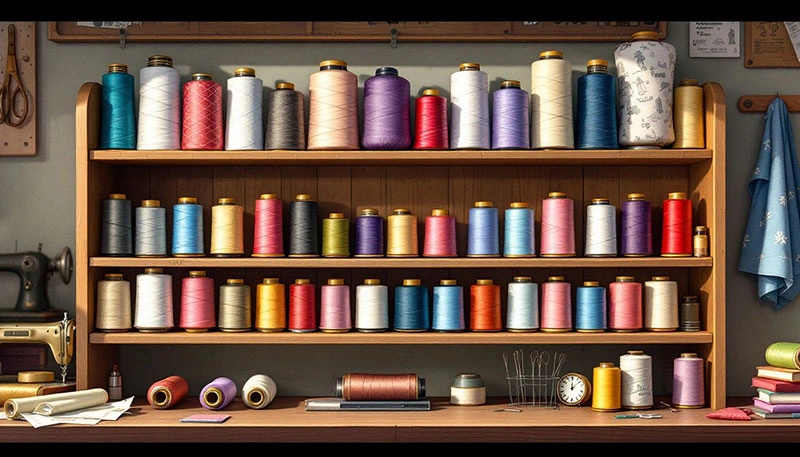
Choosing the right sewing thread is crucial for achieving professional results in your sewing projects. Using cheap threads can lead to common issues like snapping and tangling, which negatively impact your sewing experience.
Investing in high-quality threads can prevent these problems, ensuring longevity and a better finish for your garments.
Recognizing High-Quality Brands
Some of the top sewing thread brands available on the market include Gutermann, Coats & Clark, and Mettler. These brands are recognized for their reliable threads that ensure consistent stitch formation and minimal breakage. Choosing reputable brands is crucial for ensuring quality in sewing threads, as they directly impact the outcome of sewing projects.
Reading Spool Labels
Spool labels are essential tools for understanding the properties of thread, facilitating informed decisions in thread selection. These labels provide critical details such as fiber composition, ply count, and weight, which are essential for proper thread selection.
Reading spool labels helps you choose the right thread for your specific sewing needs.
Matching Thread to Fabric
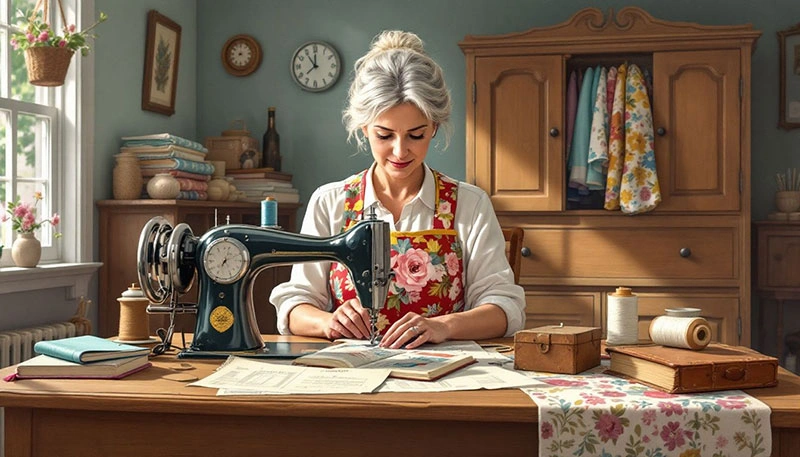
Different sewing projects require specific thread types to achieve optimal results. Matching the thread to the fabric is crucial for ensuring that the stitching complements the fabric’s characteristics, such as thickness and stretch.
Let’s explore how to select the right thread for various fabric types.
Thicker Fabrics
When working with thicker fabrics like denim and upholstery, extra strong threads are required to ensure durability. For denim projects, Gutermann denim thread, a polyester cotton blend, is highly recommended. Jeans top stitching thread is ideal for achieving a professional jeans look.
For upholstery projects, using a robust thread like upholstery thread is suggested to handle the heavy-duty nature of the fabric. These heavier threads provide the necessary strength to withstand the stress and strain that thicker materials endure.
Lightweight Fabrics
Lightweight fabrics require finer threads and a thinner thread to avoid bulkiness and maintain the fabric’s airy quality. Choosing the correct thread weight and type enhances the finish of lightweight fabric projects. Finer threads ensure stitches do not overpower the delicate fabric.
When sewing with lightweight fabrics, it is crucial to adjust the sewing machine settings to accommodate the finer thread, ensuring smooth and even stitches. This attention to detail helps maintain the integrity and appearance of the fabric.
Stretch Fabrics
Threads for stretch fabrics should allow for movement and recovery without breaking. Elastic threads are particularly suitable for stretch fabrics as they maintain elasticity, supporting the fabric’s stretch and return properties. Adjusting the tension on your sewing machine can prevent problems like thread breakage and looping.
The appropriate thread type allows stitches to handle the stretch and movement of the fabric, resulting in a durable and flexible product. This is crucial for garments needing a snug fit and frequent movement.
Thread Weight and Its Importance
Thread weight denotes the thickness and strength of the thread, impacting sewing performance. Knowing thread weight is important for selecting the right thread, as it influences seam strength, durability, and the overall look of your stitching.
Understanding Thread Weight Numbers
The first number on the spool indicates the fineness of the thread, with higher numbers signifying finer threads. These finer threads are best suited for lightweight fabrics and detailed embroidery projects. Conversely, lower thread weight numbers represent thicker threads, which are suitable for heavy fabrics like denim and leather.
Thread weight numbers such as 40wt or 60wt are crucial for choosing the right thread for your project. Understanding these numbers helps you select the appropriate thread that matches the fabric and the desired outcome of your sewing project.
Selecting the Right Weight for Your Project
Using the correct thread weight is essential for achieving the desired appearance and functionality in stitching. Using a thread that is too thick or too thin for the machine can lead to suboptimal performance, including issues like thread breakage and improper tension.
Testing threads on scrap fabric ensures compatibility with your sewing machine and fabric. This allows for necessary adjustments before beginning the main project, ensuring smooth sewing.
Specialty Threads for Unique Projects
Specialty threads like metallic and variegated threads are designed to enhance the visual appeal of sewing projects. These threads add unique elements that can elevate the creativity and functionality of your work.
Here are some popular specialty threads and their uses.
Metallic Threads
Metallic threads offer a luxurious finish, ideal for decorative purposes and adding shimmer to garments for special occasions. They can break easily, so sew slowly and use a metallic needle to prevent damage.
These threads come in various colors, allowing for a wide range of creative projects. Metallic threads are commonly made from materials like aluminum, copper, brass, and silver, and their highly reflective nature makes them stand out in any project.
Variegated Threads
Variegated threads are multicolored threads that blend from one color to another, creating smooth color transitions. They are primarily used in machine embroidery and quilting to add visual interest and unique effects to projects.
Sulky is a well-known brand that sells decorative threads, including variegated options. These threads are perfect for adding vibrant and dynamic patterns to your sewing projects, making them a favorite among many sewists.
Elastic Threads
Elastic thread is essential for creating gathered or ruffled effects in garments. It is primarily used for shirring and smocking, providing the necessary stretch and recovery for snug fits. When using elastic thread, it is wound onto a bobbin by hand to prevent stretching.
This type of thread is ideal for projects that require elasticity, such as activewear and children’s clothing. Elastic threads ensure that the finished product can move and stretch comfortably with the wearer, maintaining both fit and form.
Storing and Maintaining Your Threads
Proper storage and maintenance are crucial for preserving the condition and longevity of sewing threads. Organizing spools in clear bins prevents tangling and maintains their condition.
Let’s explore some techniques for storing and maintaining your threads.
Proper Storage Techniques
Store threads in a cool, dry place, away from direct sunlight to prevent degradation. Organize by type and color for easy access, using divided storage boxes to keep them separated. A thread rack can help keep spools organized and minimize dust exposure.
Clear storage cases protect threads from dust while allowing for visibility. Airtight containers help to keep dust and moisture out of thread storage, extending the life of your threads and ensuring they remain in good condition for future projects.
Extending Thread Life
Avoiding direct sunlight is crucial as UV rays can degrade thread fibers over time. Storing threads in airtight containers can help protect them from moisture and prolong their lifespan. Keeping threads stored in dark conditions can help prevent degradation from light exposure.
Following these storage and maintenance tips keeps your threads in top condition, ready for use. Proper care and storage maintain the quality and performance of your sewing threads.
Troubleshooting Common Thread Issues
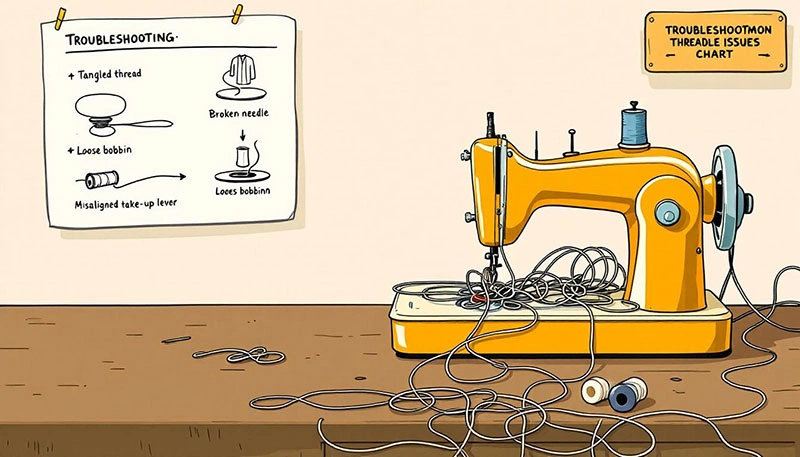
Troubleshooting common thread issues is essential for smooth sewing experiences. Replace threads showing signs of discoloration and loss of elasticity.
Let’s explore how to address some of these common issues.
Adjusting Tension
Sewing machine tension is crucial for ensuring that the upper thread and the bobbin thread interlock correctly, helping to avoid sewing machine thread breakage and messy stitches. Different fabrics and sewing machine threads have unique characteristics, which may require adjusting the tension settings to achieve the best results.
Adjust tension by making small changes based on fabric type and testing on scrap fabric before starting the main project. This ensures the correct tension for smooth, even stitches.
Choosing the Right Needle
Using the correct needle size and type is essential for optimal sewing results. The needle’s size and type must match the chosen thread to prevent issues like fabric damage or thread breakage. Always consider the needle characteristics in relation to the thread for seamless sewing experiences.
After choosing the right thread, checking the sewing needle is crucial to ensure that it is compatible with the thread and fabric being used. This step helps prevent common sewing issues and ensures a smooth and successful sewing process.
Summary
Summarizing the key points, choosing the right thread is pivotal for the success of any sewing project. From understanding different thread types to selecting the appropriate thread weight and maintaining thread quality, every detail matters. Remember, investing in high-quality threads and proper storage techniques can make a significant difference in your sewing outcomes.
Frequently Asked Questions
What is the best type of thread for general sewing?
All-purpose polyester thread is the best choice for general sewing due to its versatility and strength. It works well with various fabrics, making it ideal for most sewing projects.
How do I choose the right thread weight?
Choose the right thread weight by considering the fabric type and the final look you want to achieve—higher numbers denote finer threads suitable for delicate materials, while lower numbers work better for heavier fabrics. This will ensure your project meets your expectations.
Why does my thread keep breaking?
Thread breakage is often due to incorrect tension, low-quality thread, or using an unsuitable needle. Adjusting these elements should help resolve the issue.
How should I store my sewing threads?
To protect your sewing threads, store them in a cool, dry, and dark place using airtight containers. This will prevent damage from sunlight and moisture, ensuring their longevity.
What are metallic threads used for?
Metallic threads are predominantly used for decorative stitching, enhancing garments and projects with a shimmering effect. They add a distinctive sparkle that elevates the overall appearance.
Related Topics
- Best Sewing Machine Thread: Must-Have for Every DIY Enthusiast in 2024
- Best Sewing Machine Threads: Threading Success in 2023 Without the Hassle
- Master Your Craft with the Best Cotton Thread for Sewing Machines
- Stitch Perfectly Every Time with the Best Thread for Your Brother Sewing Machine
- Best Sewing Thread for Singer Machine: Mastering Your Choices
- Mastering Your Babylock Sewing Machine with the Best Thread
- Transform Your Sewing Projects with the Best Thread for Janome Sewing Machine
- Best Thread for Bernina Sewing Machine: Elevate Your Sewing Projects
